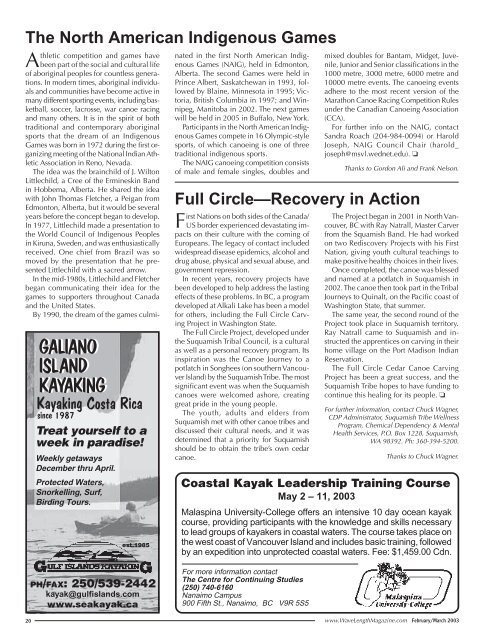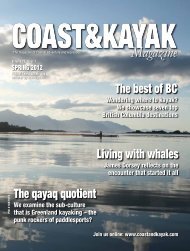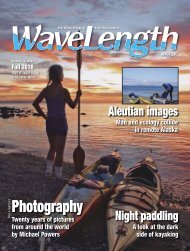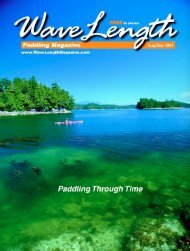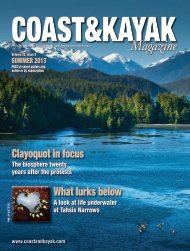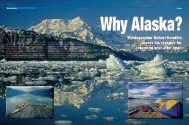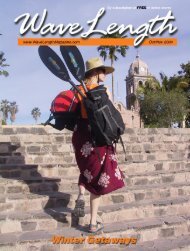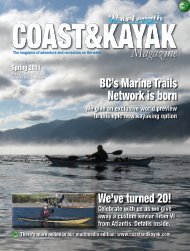download - WaveLength Paddling Magazine
download - WaveLength Paddling Magazine
download - WaveLength Paddling Magazine
You also want an ePaper? Increase the reach of your titles
YUMPU automatically turns print PDFs into web optimized ePapers that Google loves.
The North American Indigenous Games<br />
Athletic competition and games have<br />
been part of the social and cultural life<br />
of aboriginal peoples for countless generations.<br />
In modern times, aboriginal individuals<br />
and communities have become active in<br />
many different sporting events, including basketball,<br />
soccer, lacrosse, war canoe racing<br />
and many others. It is in the spirit of both<br />
traditional and contemporary aboriginal<br />
sports that the dream of an Indigenous<br />
Games was born in 1972 during the first organizing<br />
meeting of the National Indian Athletic<br />
Association in Reno, Nevada.<br />
The idea was the brainchild of J. Wilton<br />
Littlechild, a Cree of the Ermineskin Band<br />
in Hobbema, Alberta. He shared the idea<br />
with John Thomas Fletcher, a Peigan from<br />
Edmonton, Alberta, but it would be several<br />
years before the concept began to develop.<br />
In 1977, Littlechild made a presentation to<br />
the World Council of Indigenous Peoples<br />
in Kiruna, Sweden, and was enthusiastically<br />
received. One chief from Brazil was so<br />
moved by the presentation that he presented<br />
Littlechild with a sacred arrow.<br />
In the mid-1980s, Littlechild and Fletcher<br />
began communicating their idea for the<br />
games to supporters throughout Canada<br />
and the United States.<br />
By 1990, the dream of the games culmi-<br />
GALIANO<br />
ISLAND<br />
KAYAKING<br />
Kayaking Costa Rica<br />
since 1987<br />
Treat yourself to a<br />
week in paradise!<br />
Weekly getaways<br />
December thru April.<br />
Protected Waters,<br />
Snorkelling, Surf,<br />
Birding Tours.<br />
est.1985<br />
nated in the first North American Indigenous<br />
Games (NAIG), held in Edmonton,<br />
Alberta. The second Games were held in<br />
Prince Albert, Saskatchewan in 1993, followed<br />
by Blaine, Minnesota in 1995; Victoria,<br />
British Columbia in 1997; and Winnipeg,<br />
Manitoba in 2002. The next games<br />
will be held in 2005 in Buffalo, New York.<br />
Participants in the North American Indigenous<br />
Games compete in 16 Olympic-style<br />
sports, of which canoeing is one of three<br />
traditional indigenous sports.<br />
The NAIG canoeing competition consists<br />
of male and female singles, doubles and<br />
First Nations on both sides of the Canada/<br />
US border experienced devastating impacts<br />
on their culture with the coming of<br />
Europeans. The legacy of contact included<br />
widespread disease epidemics, alcohol and<br />
drug abuse, physical and sexual abuse, and<br />
government repression.<br />
In recent years, recovery projects have<br />
been developed to help address the lasting<br />
effects of these problems. In BC, a program<br />
developed at Alkali Lake has been a model<br />
for others, including the Full Circle Carving<br />
Project in Washington State.<br />
The Full Circle Project, developed under<br />
the Suquamish Tribal Council, is a cultural<br />
as well as a personal recovery program. Its<br />
inspiration was the Canoe Journey to a<br />
potlatch in Songhees (on southern Vancouver<br />
Island) by the Suquamish Tribe. The most<br />
significant event was when the Suquamish<br />
canoes were welcomed ashore, creating<br />
great pride in the young people.<br />
The youth, adults and elders from<br />
Suquamish met with other canoe tribes and<br />
discussed their cultural needs, and it was<br />
determined that a priority for Suquamish<br />
should be to obtain the tribe’s own cedar<br />
canoe.<br />
mixed doubles for Bantam, Midget, Juvenile,<br />
Junior and Senior classifications in the<br />
1000 metre, 3000 metre, 6000 metre and<br />
10000 metre events. The canoeing events<br />
adhere to the most recent version of the<br />
Marathon Canoe Racing Competition Rules<br />
under the Canadian Canoeing Association<br />
(CCA).<br />
For further info on the NAIG, contact<br />
Sandra Roach (204-984-0094) or Harold<br />
Joseph, NAIG Council Chair (harold_<br />
joseph@msvl.wednet.edu). ❏<br />
Thanks to Gordon Ali and Frank Nelson.<br />
Full Circle—Recovery in Action<br />
The Project began in 2001 in North Vancouver,<br />
BC with Ray Natrall, Master Carver<br />
from the Squamish Band. He had worked<br />
on two Rediscovery Projects with his First<br />
Nation, giving youth cultural teachings to<br />
make positive healthy choices in their lives.<br />
Once completed, the canoe was blessed<br />
and named at a potlatch in Suquamish in<br />
2002. The canoe then took part in the Tribal<br />
Journeys to Quinalt, on the Pacific coast of<br />
Washington State, that summer.<br />
The same year, the second round of the<br />
Project took place in Suquamish territory.<br />
Ray Natrall came to Suquamish and instructed<br />
the apprentices on carving in their<br />
home village on the Port Madison Indian<br />
Reservation.<br />
The Full Circle Cedar Canoe Carving<br />
Project has been a great success, and the<br />
Suquamish Tribe hopes to have funding to<br />
continue this healing for its people. ❏<br />
For further information, contact Chuck Wagner,<br />
CDP Administrator, Suquamish Tribe Wellness<br />
Program, Chemical Dependency & Mental<br />
Health Services, P.O. Box 1228, Suquamish,<br />
WA 98392. Ph: 360-394-5200.<br />
Thanks to Chuck Wagner.<br />
Coastal Kayak Leadership Training Course<br />
May 2 – 11, 2003<br />
Malaspina University-College offers an intensive 10 day ocean kayak<br />
course, providing participants with the knowledge and skills necessary<br />
to lead groups of kayakers in coastal waters. The course takes place on<br />
the west coast of Vancouver Island and includes basic training, followed<br />
by an expedition into unprotected coastal waters. Fee: $1,459.00 Cdn.<br />
PH/FAX: 250/539-2442<br />
kayak@gulfislands.com<br />
www.seakayak.ca<br />
For more information contact<br />
The Centre for Continuing Studies<br />
(250) 740-6160<br />
Nanaimo Campus<br />
900 Fifth St., Nanaimo, BC V9R 5S5<br />
20 www.<strong>WaveLength</strong><strong>Magazine</strong>.com February/March 2003


